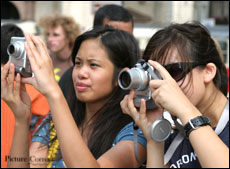
Digital cameras are not just a hyped buzz word. They have real advantages over film cameras. In the beginning of the digital era many claimed that digital cameras are inferior in quality to film cameras. One of the main arguments was that printing enlargement from digital photos results in poor quality. While this was true back then new digital cameras with modern sensors and a large number of mega pixels provide superior quality even when printing enlargements.
Just having the same or better photo quality is not a good enough reason to switch. Using digital cameras and digital photos and switching to digital media has many advantages, here are just a few:
Photo cost: digital cameras take digital photos that are stored on digital media. For all practical purposes the marginal cost of taking digital photos is zero. You can view, manipulate and discard such digital photos without spending a dime. If you were using film you would have to spend money on developing the film roll in order to view your photos. Developing prints would cost more.
Photo capacity: digital cameras store digital photos on digital media. With modern memory chipsets the storage available on such media is practically infinite. You can hold thousands and more photos on each media card and since these cards are so small you can easily carry extra cards with you. With infinite photo capacity you can take many photos without thinking of the problem of running out of space. With old film cameras each roll would typically hold 36 photos. Film rolls were relatively big and you could only carry so many rolls with you. The result was thinking twice before taking a photo and in many cases missing great photo opportunities.
Immediate feedback: a great feature of digital cameras is the ability to immediately view the photos taken. Such immediate feedback allows better photos since you can check the composition and the quality of the photo and immediately take more photos to correct what you found was wrong. With old film cameras you had to wait until the film was developed in order to review the photos. Obviously at that time it was not possible to shoot the photo again to correct any problems in the photo.
Photo manipulation: digital photos are computer files stored on digital media. As such they can be easily manipulated with photo processing software. Such software can reside built-in the digital camera or installed on your personal computer. Photo processing software allows such manipulation as red-eye removal, contrast enhancements and more. Such manipulation is impossible with film cameras. The only way to manipulate film based photos is by converting them to digital photos through the process of photo scanning.
Adapt to changing conditions: digital cameras use electronic sensors instead of physical film. The camera can electronically set the sensor to different modes in order to support different photo shooting conditions such as different light conditions, different light sources, speed of the object photographed etc. The sensor settings can be changed instantly for each photo taken. With film cameras each film roll would be designed for a specific condition such as different light sensitivities, granularity and more. Once a film was loaded you had to take shoot the complete roll using the sane setting, or change rolls.
Longevity: digital photos never lose their quality. Digital photos are digitally saved on digital media and as such they will be identical tomorrow and 1000 years from now. They do not turn yellow and do not fade as film prints.
Ziv Haparnas is a technology veteran and writes about practical technology and science issues. This article can be reprinted and used as long as the resource box including the backlink is included. You can find more information about photo album printing and photography in general on http://www.printrates.com – a site dedicated to photo printing.
Like This Article?
Don't Miss The Next One!
Join over 100,000 photographers of all experience levels who receive our free photography tips and articles to stay current:






You are missing a very important point, well two really. Yes I am a technologist at heart but those who use film as their photographic medium do so from a purist perspective and enjoy the process of crafting the image. Digital is so forgiving it masks the lack of skill in most current photographers. As they say photography is a language most don’t speak. Also digital data on any electronic device is not guaranteed and can be corrupted. Just a though. Stay curious – Adrian